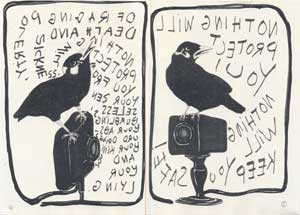Francis Halsall’s website of gems includes the following note as part of a reflection on the work of Garrett Phelan.
J.A. Baker’s little book, The Peregrine [1968], still has the power to arrest, astonish and unsettle. From autumn to spring in coastal East Anglia the author followed, meticulously, fanatically a pair of peregrine falcons and constructed a bare narrative around the experience. What arrests is the breathless, addictive pursuit of the mark, continuing almost every day, without rest, from October to April. During this time he records 619 kills by the hawks, an ugly figure perhaps, but one that his own quest is in a sort of weird simpatico with. What astonishes are the descriptions which become almost too intense to bear, certainly in a single reading. Landscapes emerge from careful, patient acts of immersive observation. So, during an October evening: “the wet fields exhaled that indefinable autumnal smell, a sour-sweet rich aroma of cheese and beer, nostalgic, pervasive in the heavy air. I heard a dead leaf loosen and drift down to the shining surface of the lane with a light, hard sound;” and on a partridge corpse: “Blood looked black in the dusk, bare bones white as a grin of teeth. A hawk’s kill is like the warm embers of a dying fire.” And what unsettles is the total identification that Baker reaches with both the landscape and the animals…

…Humans will always stumble in the face of the synesthetic and ontological riot of experience because being in the “absolute present” of the world is like hunting a swift, slippery quarry. It seems difficult if not impossible to catch as we can be weighed down with the baggage of culture, history, memory. Phelan’s response is to propose a type of feral phenomenology….
In 2005 David Foster Wallace opened a speech with the following parable:
“There are these two young fish swimming along, and they happen to meet an older fish swimming the other way, who nods at them and says, ‘Morning, boys, how’s the water?’ And the two young fish swim on for a bit, and then eventually one of them looks over at the other and goes, ‘What the hell is water?’”
Just like the fish we often can’t see the water we swim in. Phenomena occur at a human scale because they occur in the human world. The challenge is to think beyond these limits; to think of voodoo free phenomenon. To be like an artist perhaps, or even a falcon. (from Francis Halsall).
Rob Shields, University of Alberta